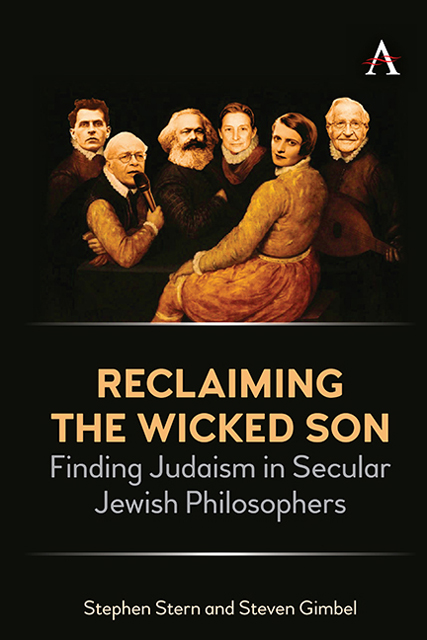Book contents
- Frontmatter
- Dedication
- Contents
- Introduction: Reclaiming the Wicked Son
- 1 Karl Marx and Materialistic Messianism
- 2 Ludwig Wittgenstein and Neo-Talmudic Thought
- 3 Ayn Rand and the Hassidic Courts
- 4 Peter Singer: The Amos of Anim
- 5 Judith Butler and Orthopraxy
- 6 Noam Chomsky, Kabbalist
- Conclusion: Re-Membering the Tribe
- Bibliography
- Index
Conclusion: Re-Membering the Tribe
Published online by Cambridge University Press: 10 January 2023
- Frontmatter
- Dedication
- Contents
- Introduction: Reclaiming the Wicked Son
- 1 Karl Marx and Materialistic Messianism
- 2 Ludwig Wittgenstein and Neo-Talmudic Thought
- 3 Ayn Rand and the Hassidic Courts
- 4 Peter Singer: The Amos of Anim
- 5 Judith Butler and Orthopraxy
- 6 Noam Chomsky, Kabbalist
- Conclusion: Re-Membering the Tribe
- Bibliography
- Index
Summary
It may seem odd to point out that the primary focus of the Jewish Studies literature is Judaism. After all, what else would it be? But this mono focus on Judaism omits the work of secular Jews who have been among the most important and influential contributors to every field in the arts and letters. Like a teenager after a breakup, the attitude is largely, “if you don't care about me, then I don't care about you.” If these thinkers reject their Jewishness, at least in their intellectual endeavors, why should those who study Jewishness devote time to them? As a result, Secular Jewish Studies is pursued with less vigor.
But doing so unnecessarily impoverishes the field. Jewishness is bigger than Judaism. It may be purely an accident of history that the great revolutionaries who launched modernity in their fields—Albert Einstein in physics, Emile Durkheim in sociology, Arnold Schoenberg in music, etc. just to name a few—were Jewish. But surely it is more than a mere accident. These were outsiders who emerged from a lived context to change the context in which we live. Art historians and historians of science will study their work relative to their peers, relative to their professional situation, but it ought to be the job of those in the Jewish Studies community to provide an even larger contextu alization. Secular Jews are Jews and their Jewishness needs to be understood in their lives and works.
One way to do that is to engage in the sort of bridge building that comprises this volume. By connecting secular Jewish thinkers and artists to Judaism, allows them to re-enter the tribe. Jews are proud of the famous Jews we know of or learn about. This sort of game provides a handle with which to ground that pride. This is not to say that we should deprive secular Jews of their secularity. That surely needs to be respected, but the associativity of this sort of project (without causal claims) allows secular Jews to be both secular and Jews.
This is a project we have been engaged in for a decade. Our initial work re-Judaizing a secular Jewish figure was our article, “Einstein's Jewish Science” and we followed that with treatments of Jerry Seinfeld and Rube Goldberg (this last piece required our co-author Olivia Handelman). This volume pre sents six more.
- Type
- Chapter
- Information
- Reclaiming the Wicked SonFinding Judaism in Secular Jewish Philosophers, pp. 121 - 122Publisher: Anthem PressPrint publication year: 2022



